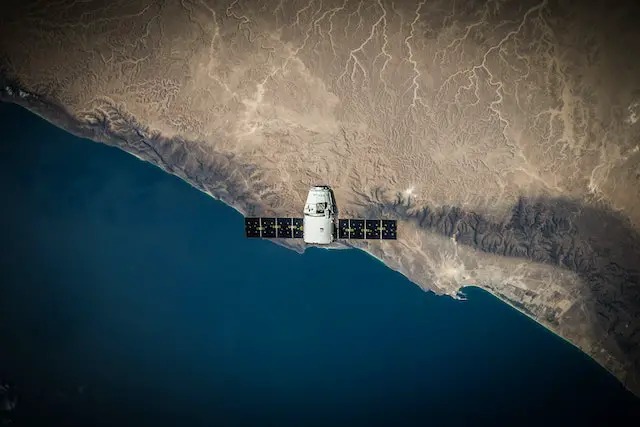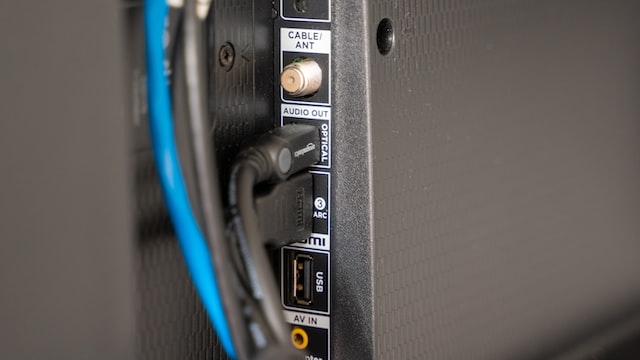In conclusion, satellite TV and cable TV both provide access to the same channels and programming. Satellite TV offers more flexibility in terms of packages and pricing while cable TV provides a more reliable connection with fewer interruptions in service.
What is satellite TV?
(Photo by SpaceX: https://www.pexels.com/photo/aerial-view-earth-exploration-flying-60132/)

Satellite TV is a type of television programming that is delivered via satellite, as opposed to through traditional cable or over-the-air methods. Satellite TV generally offers a wider selection of channels and higher quality pictures and sound than cable TV, but it can be more expensive to subscribe to.
There are two main types of satellite TV: Direct broadcast satellite (DBS) and Dish network.
DBS systems like DIRECTV and DISH Network provide hundreds of channels of digital programming directly to your home. These signals are beamed from powerful satellites in orbit around the earth, and then received by a small dish antenna on your property.
What is cable TV?
(Photo by Patrick Campanale on Unsplash )

Cable television, often called simply “cable,” is a system that delivers television programming to consumers via coaxial cables, or in more recent systems, light pulses through fiber-optic cables. It is an extension of the traditional over-the-air broadcast model, in which broadcasters send signals to viewers through the atmosphere.
While most cable systems use a single cable to deliver both video and audio signals to subscribers’ homes, some newer systems are beginning to use separate cables for each. This allows for higher quality audio and video signals, as well as the ability to offer interactive services like video on demand and pay-per-view programming.
In addition to traditional television programming, cable companies also offer high-speed Internet access and digital telephone service over their networks. These services are typically bundled together at a discounted rate, making them an attractive option for consumers who want “triple play” service from a single provider.
The difference between satellite TV and cable TV
One of the biggest differences between satellite TV and cable TV is the price. Satellite TV tends to be more expensive than cable TV, because it requires special equipment like a satellite dish. Cable TV, on the other hand, only requires a standard cable box, which is often provided by your cable company.
Another difference between satellite TV and cable TV is the selection of channels. Satellite TV usually offers more channels than cable TV, because it has access to more satellites. Cable TV typically has a smaller channel selection, because it only has access to one or two local cable networks.
Finally, another difference between satellite TV and cable TV is the quality of the signal. Satellite TV usually has a better signal quality than cable TV, because it uses line-of-sight technology. Cable TV relies on electrical signals that can be degraded by things like bad weather or power outages.
Why satellite TV is better than cable TV
There are many reasons why satellite TV is better than cable TV. Satellite TV offers a wider range of channels, including many international channels that are not available on cable. Satellite TV also offers a higher quality picture and sound than cable TV.
Satellite TV is also more affordable than cable TV. Satellite TV companies offer various packages that include different channels at different price points. This allows you to choose a package that fits your budget and your viewing needs. In contrast, cable TV companies typically charge one flat rate for their service, which can be quite expensive.
Finally, satellite TV is more convenient than cable TV. Satellite TV can be installed almost anywhere, even in remote areas where cable TV is not available. And with new advances in technology, it’s easier than ever to set up and use satellite TV.
How is satellite TV delivered?
Satellite TV is delivered to your home via a satellite dish. The satellite transmits signals from a variety of channels to the dish, which then sends the signal to your TV. Satellite TV generally has a wider selection of channels than cable TV, and the picture quality is usually better than cable. However, satellite TV can be more expensive than cable, and it can be affected by bad weather more than cable.
How do I connect my TV to satellite?
In order to connect your TV to satellite, you will need a satellite dish and a receiver. The satellite dish is usually installed on the roof of your home, and the receiver is usually connected to the TV.
Most people who have satellite TV also have a cable TV connection. However, there are some people who only have satellite TV. If you only have satellite TV, you will need to purchase a separate receiver for each TV in your home.
How is cable TV delivered?
Cable TV is delivered to your home through underground cables. The cables are connected to a series of poles that run along streets and into homes. Cable companies use these poles to deliver the signal from their stations directly into your home. Cable TV typically has a smaller selection of channels than satellite TV, but the picture quality is usually just as good as satellite. Cable TV is also typically less expensive than satellite TV.
Which is faster satellite or cable?
Satellite TV can be faster than cable TV, but it really depends on your specific service and set-up. Cable TV usually has a higher data allowance than satellite TV, so if you are watching a lot of HD or 4K content, you may find that your satellite TV connection is slower than your cable TV connection. However, satellite TV can offer faster speeds for certain types of content, such as live sporting events.
What is DISH network?
DISH Network is a direct-broadcast satellite television provider. DISH offers a number of unique features that set it apart from traditional cable companies, most notably its pay-as-you-go programming options and its ability to record and store high-definition content.
While cable companies tend to offer a one-size-fits-all approach to television service, DISH provides its customers with more flexible viewing options. For example, DISH offers an à la carte programming option that allows customers to select the channels they want to pay for, instead of being forced to subscribe to a pre-packaged bundle of channels. This à la carte option can save customers money, as they only have to pay for the channels they actually watch.
In addition, DISH’s Hopper DVR system can record up to eight shows at once and store up to 2,000 hours of HD content. This makes it easy for customers to catch up on their favorite shows or recorded events, even if they’re not able to watch them live. Cable companies typically only allow customers to record one show at a time and often charge extra fees for DVR service.
Can I use satellite cable for cable TV?
Yes, you can use satellite cable for your cable TV service. However, there are a few things to keep in mind. First, satellite cable is more expensive than traditional cable TV service. Secondly, satellite cable requires a clear line of sight to the south-facing sky, so if you have trees or buildings in the way, you may not be able to get service. Finally, satellite TV signals can be disrupted by severe weather, so if you live in an area with frequent thunderstorms or snowstorms, you may want to consider a different type of TV service.
Can I watch TV without satellite or cable?
Yes, you can watch TV without satellite or cable. There are a number of ways to do this, including using an antenna, streaming services, or a TV with built-in streaming capabilities.
If you want to watch TV without satellite or cable, one option is to use an antenna. Antennas are devices that pick up over-the-air signals from broadcast towers. If you live in an urban area, you may be able to get good reception with a small indoor antenna. For rural areas, however, you’ll likely need a larger outdoor antenna. Once you have your antenna set up, you’ll be able to watch any channels that are broadcasting in your area.
Another option for watching TV without satellite or cable is to use a streaming service. There are many different streaming services available, such as Netflix, Hulu, and Amazon Prime Video. These services allow you to watch TV shows and movies online. Most of them require a monthly subscription fee, but they typically offer a free trial period so you can try them out before committing.
If you don’t want to use an antenna or streaming service, another option is to buy a TV with built-in streaming capabilities. These days, many TVs come with apps like Netflix and Hulu pre-installed. You’ll just need to connect your TV to the internet and sign in with your account information.
Does satellite TV require internet?
Satellite TV does not require internet, but it can be used with it. Internet can be used to stream live or on-demand content from your satellite provider, as well as provide access to additional channels and services.
What is Internet TV?
Internet TV, also known as streaming TV, is a type of television that uses the internet to deliver content. It’s different from traditional cable or satellite TV because it doesn’t require a physical cable or satellite dish – all you need is an internet connection.
There are two main ways to stream TV: live and on-demand. Live streaming is when you watch a show or channel as it’s happening in real-time. On-demand streaming is when you choose what you want to watch from a library of movies and shows.
Most internet TV services offer a mix of both live and on-demand content. For example, Netflix offers a library of movies and shows that you can watch whenever you want, but it also offers some exclusive original programming that can only be watched live.
Internet TV is growing in popularity because it’s flexible and convenient. You can watch it on your own schedule, and you can access it from anywhere in the world with an internet connection.
Is cable internet good?
Cable internet is a type of broadband internet that uses a cable modem to connect to the internet. It is widely available in urban areas and provides high-speed internet access. Cable internet is typically faster than DSL and satellite internet, making it a good choice for online gaming, streaming video, and other bandwidth-intensive activities.
How fast is cable internet?
Cable internet is much faster than satellite internet. It uses a cable connection instead of a satellite dish, so it can deliver speeds up to 100 Mbps.
What are the disadvantages of satellite internet?
Satellite internet generally has slower speeds than cable internet, making it less ideal for activities that require a lot of bandwidth, like online gaming or streaming video. Satellite internet can also be affected by bad weather, while cable internet is not. And because satellite internet requires a dish installed on your property, it generally costs more to set up and maintain than cable internet.
Is satellite better than Fibre?
Satellite TV and cable TV are two very different technologies that deliver television programming to your home. Satellite TV uses a dish to receive signal from a satellite in orbit, while cable TV uses a network of cables buried underground to deliver signal from a local source.
So, which is better? Well, it depends on your needs and preferences. Here are some things to consider when making your decision:
Location: If you live in a rural area, you may not have access to cable TV service. In this case, satellite TV would be your only option.
Cost: Satellite TV tends to be more expensive than cable TV, but the monthly price can vary depending on the type of programming you choose.
HD channels: If you want access to HD channels, you’ll need to get satellite TV. Cable companies are beginning to offer HD channels in some areas, but the selection is still limited compared to what’s available with satellite.
Installation: Installing a satellite dish can be tricky, and you’ll need a clear view of the southern sky for it to work properly. Cable installation is typically much simpler and doesn’t require any special equipment or knowledge.
Featured Image By – Photo by Vidal Balielo Jr. on pexles.com








